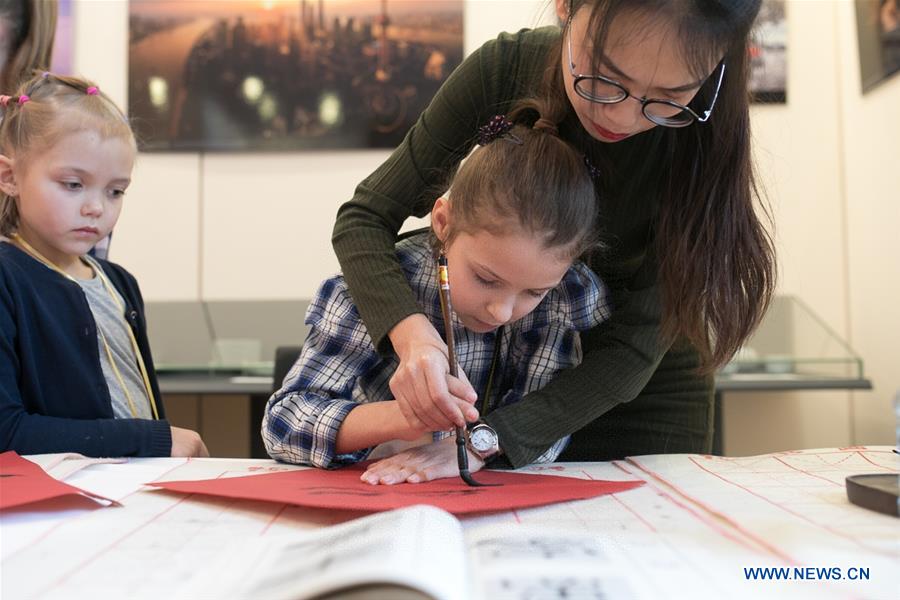Xi's visit to open new prospects for China-Russia ties

A Russian girl learns Chinese calligraphy at a Spring Festival celebration held by the China Culture Center in Moscow, Russia, Feb. 2, 2019. (Xinhua/Bai Xueqi)
China-Russia relations are set to embrace yet another "highlight moment" as Chinese President Xi Jinping travels to Russia on Wednesday for a new state visit and the St. Petersburg International Economic Forum (SPIEF).
During the trip, Xi and his Russian counterpart, Vladimir Putin, are expected to draw a blueprint for the future development of bilateral ties, and lift the China-Russia comprehensive strategic partnership of coordination to a new stage.
A VISIT SIGNIFICANT TO RELATIONS
Expectations are running high for the three-day tour, which comes as China-Russia relations are now standing at a new starting point 70 years after the two countries established diplomatic ties.
Xi and Putin will review the achievements and experience in the development of the bilateral relationship over the past seven decades, chart the course for its future development, and further elevate the China-Russia partnership, said Chinese Vice Foreign Minister Zhang Hanhui at a press briefing.
The two leaders, according to Zhang, will also sign or witness the signing of important cooperation documents, and attend a gathering celebrating the 70 anniversary of bilateral diplomatic ties.
Thanks to the strategic guidance by the two heads of state and joint efforts of both sides, recent decades have seen the China-Russia partnership upgraded multiple times.
Xi's visit, said Zhang, will "consolidate the political foundation of Sino-Russian relations, reaffirm their mutual support to each other on issues involving respective core and major concerns, and ensure the ties will not be affected by any change in the international situation."
The visit will "be of milestone significance in the development of bilateral relations," and "surely promote greater development ... under the new situation," Zhang added.
COOPERATION YIELDS FRUITS
As bilateral relations grow closer, practical cooperation between the two neighboring large countries has also been advancing on the fast track.
Bilateral trade hit a record high of over 100 billion U.S. dollars in 2018, up 27.1 percent year-on-year, the highest pace among the top 10 trading partners of China.
Cooperation has been deepening in energy, nuclear power and aerospace sectors. The first ship carrying liquefied natural gas from Russia's Yamal Peninsula in the Arctic traversed the sea to China last summer, and millions of tons more will be supplied every year. A second line of the China-Russia oil pipeline began commercial operation in 2018, and the east-route natural gas pipeline is expected to supply gas to China by the end of this year.
The two countries have also inked a package of deals to expand nuclear cooperation, and their joint development of a wide-body long-haul passenger jet is making steady progress.
New domains of cooperation keep emerging, including digital economy, small- and medium-sized enterprises, high technology, Far East development and Arctic exploration.
In addition, people-to-people exchanges are booming. The friendship between the two peoples has been cemented through a rich variety of programs at national and local levels in such areas as culture, language, tourism, media and youth.
The Russia-China friendship absolutely serves the long-term interests of both countries and their peoples, said Dmitry Novikov, first deputy chairman of the Foreign Affairs Committee of the Russian State Duma.
Bilateral cooperation, which is at "the highest level in history," provides "an advanced cooperation model" for today's world, he added.
The strategic partnership not only benefits the two countries, but plays a key role on the global stage for promoting win-win cooperation, illustrated by the joint efforts made to establish the Shanghai Cooperation Organization and the trilateral cooperation among China, Mongolia and Russia, and their coordination within the frameworks of BRICS, Group of 20 and others.
FOR A FAIR, SAFER WORLD
During the visit, Xi will attend SPIEF for the first time, where he will address a plenary session and expound China's stance on sustainable development.
Xi's attendance has been lauded by Russian media as conferring a special status to the forum.
As trade protectionism and unilateralism are mounting, the Chinese president is also expected to reaffirm Beijing's readiness to work with all parties to promote multilateralism and improve global governance for the common development and prosperity of the global village.
The annual high-profile international business gathering has provided a platform for Russia, which has been suffering harsh economic and financial sanctions from the West, to advocate fair competition and oppose protectionism.
China has been sending high-level delegations to the forum for consecutive years and voiced unswerving support for an open world economy and a multilateral trading system.
In the last few years, synergizing the Russia-led Eurasian Economic Union (EAEU) and the China-proposed Belt and Road Initiative (BRI) has become a trending subject on the SPIEF agenda.
Yaroslav Lissovolik, chief economist of the Eurasian Development Bank, noted that dovetailing the EAEU with the BRI will promote economic growth and integration of Russia and other Eurasian nations, adding that the BRI plays a key role in the global integration process and boosts the development of transport and logistics in developing countries.
On the world stage, China-Russia coordination has become an indispensable and irreplaceable force in helping solve major global and regional hot-button issues, against the backdrop of a world that has been undergoing complicated and profound changes.
As an exemplar of win-win cooperation, good neighborliness and harmonious coexistence between major countries, China and Russia are staunch supporters of multilateralism dedicated to safeguarding international law and the basic norms in international relations, preserving global strategic stability, and helping make the world order more just and reasonable.
Looking into the future, Sergei Luzyanin, director of the Institute of Far Eastern Studies of the Russian Academy of Sciences, said Russia and China will continue to deepen their strategic partnership and jointly safeguard world peace and security.
As Chinese State Councilor and Foreign Minister Wang Yi once said, when China and Russia stand together, the world will be a safer and more peaceful and stable place.

